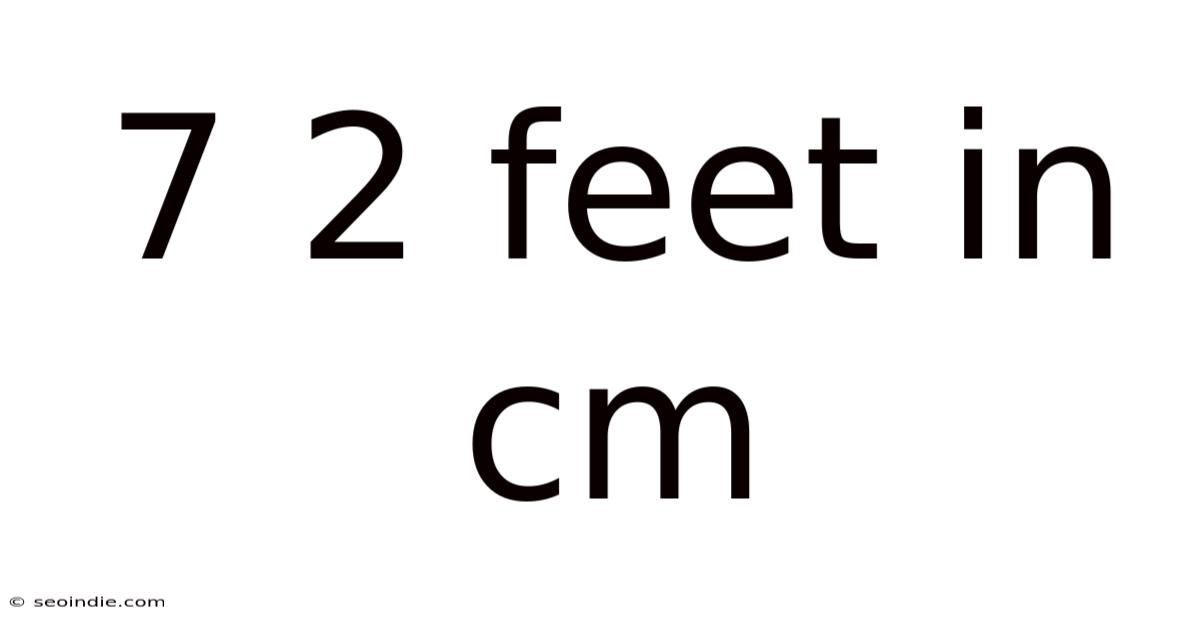7 2 Feet In Cm
seoindie
Sep 22, 2025 · 4 min read

Table of Contents
Decoding 7'2" in Centimeters: A Comprehensive Guide to Height Conversions
Understanding height conversions, especially from the imperial system (feet and inches) to the metric system (centimeters), can be surprisingly tricky. This article will comprehensively explore the conversion of 7 feet 2 inches (7'2") into centimeters, providing not just the answer but a deep dive into the process, the underlying mathematics, and frequently asked questions. We'll also explore the context of this height, its implications, and how to perform similar conversions independently. This detailed guide aims to equip you with the knowledge and skills to confidently navigate height conversions in the future.
Introduction: Why Convert Feet and Inches to Centimeters?
The imperial system, using feet and inches, is still prevalent in several countries, while the metric system, using centimeters and meters, is the international standard. This difference often necessitates conversion, especially in global contexts like international sports, medicine, and engineering. Knowing how to convert 7'2" (or any height) into centimeters is essential for accurate communication and data consistency across different systems. This article provides a step-by-step guide, ensuring you understand the process thoroughly.
Understanding the Conversion Factors
Before diving into the specific conversion of 7'2", let's establish the fundamental conversion factors:
- 1 foot (ft) = 12 inches (in): This is the foundational relationship within the imperial system.
- 1 inch (in) ≈ 2.54 centimeters (cm): This is the crucial conversion factor between the imperial and metric systems. The "≈" symbol indicates an approximation, as the conversion is actually more precise (2.54 cm is exactly defined as 1 inch).
These two factors are the keys to unlocking any feet-and-inches-to-centimeters conversion.
Converting 7'2" to Centimeters: A Step-by-Step Approach
Let's break down the conversion of 7'2" to centimeters in a clear, step-by-step manner:
Step 1: Convert feet to inches:
First, we need to convert the 7 feet into inches. Since 1 foot equals 12 inches, we multiply:
7 ft * 12 in/ft = 84 in
Step 2: Add the remaining inches:
Next, we add the remaining 2 inches to the 84 inches we just calculated:
84 in + 2 in = 86 in
Step 3: Convert inches to centimeters:
Now, we use the conversion factor of 1 inch ≈ 2.54 centimeters. We multiply the total inches by this factor:
86 in * 2.54 cm/in ≈ 218.44 cm
Therefore, 7'2" is approximately equal to 218.44 centimeters.
The Mathematical Formula for Height Conversion
The process above can be summarized into a single formula:
Total centimeters = (Feet * 12 + Inches) * 2.54
Using this formula for 7'2", we get:
(7 * 12 + 2) * 2.54 = 218.44 cm
This formula allows for quick and easy conversion of any height from feet and inches to centimeters.
Contextualizing 7'2": A Remarkably Tall Height
A height of 7'2" (218.44 cm) is exceptionally tall. It places an individual significantly above the average human height. This height is often associated with gigantism, a condition caused by excessive growth hormone production. Individuals of this stature often face unique challenges in daily life, requiring specialized accommodations and medical attention.
Frequently Asked Questions (FAQs)
Q1: Is the conversion factor of 2.54 cm/in exact?
A1: Yes, the conversion factor of 2.54 cm/in is exactly defined. It's a fundamental part of the metric system's definition. However, when performing calculations, rounding might introduce minor inaccuracies.
Q2: How can I convert other heights from feet and inches to centimeters?
A2: Use the formula: Total centimeters = (Feet * 12 + Inches) * 2.54. Simply substitute the feet and inches values of the desired height into the formula.
Q3: Are there any online converters for height?
A3: Yes, many online converters are available. However, understanding the underlying mathematical process is crucial for avoiding errors and gaining a deeper understanding of the conversion.
Q4: What are some real-world applications of this conversion?
A4: Height conversions are essential in various fields, including:
- Medicine: Accurate height measurements are crucial for diagnosis and treatment of various conditions.
- Sports: Height is a significant factor in many sports, and consistent measurement across different systems is necessary for fair competition and data analysis.
- Anthropology: Studying human body dimensions requires consistent measurement across different systems.
- Engineering: Designing spaces and equipment often requires considering the range of human heights.
Q5: What if I need to convert centimeters back to feet and inches?
A5: To convert centimeters back to feet and inches, you would first divide the centimeters by 2.54 to get the inches. Then, you divide the inches by 12 to get the feet, with the remainder representing the inches.
Conclusion: Mastering Height Conversions
Converting 7'2" to centimeters, and understanding the general process of converting heights between imperial and metric units, is a valuable skill with practical applications across various fields. This article has provided a comprehensive guide, not only giving you the answer (approximately 218.44 cm) but also explaining the underlying mathematics, offering a step-by-step approach, addressing frequently asked questions, and providing context to the extraordinary height of 7'2". By understanding these conversion principles, you are well-equipped to tackle similar conversions confidently and accurately. Remember to always double-check your calculations and consider the context of the measurement for a complete understanding.
Latest Posts
Latest Posts
-
What Is The First Octant
Sep 22, 2025
-
Newton Meter To Kg Cm
Sep 22, 2025
-
Division Of Cytoplasm Is Called
Sep 22, 2025
-
Differentiate Between Electrophile And Nucleophile
Sep 22, 2025
-
Acoelomate Vs Pseudocoelomate Vs Coelomate
Sep 22, 2025
Related Post
Thank you for visiting our website which covers about 7 2 Feet In Cm . We hope the information provided has been useful to you. Feel free to contact us if you have any questions or need further assistance. See you next time and don't miss to bookmark.